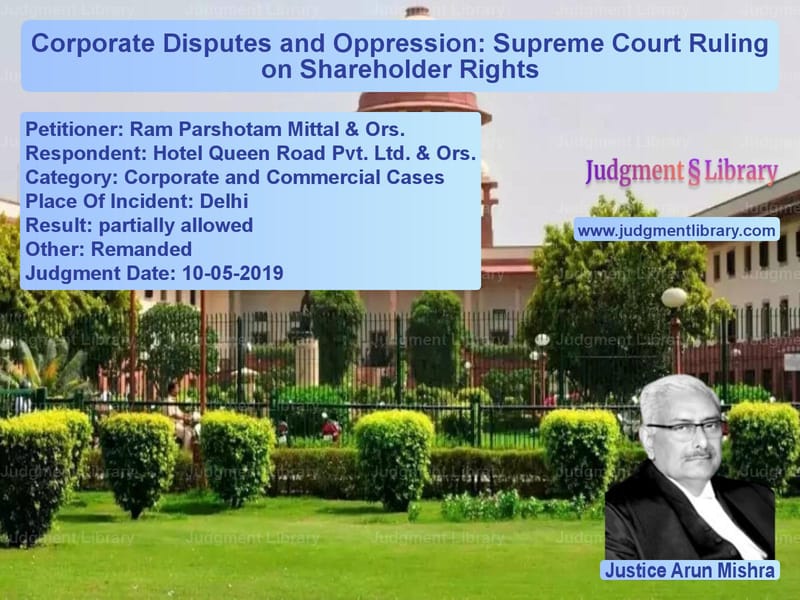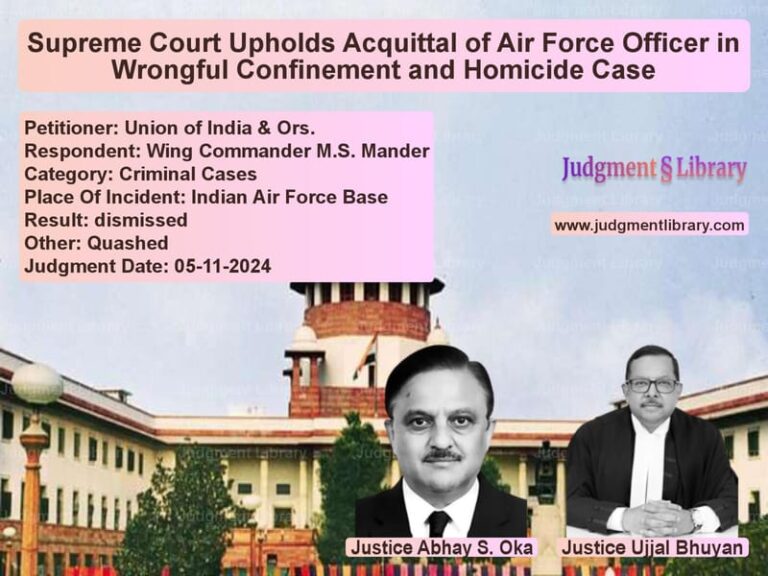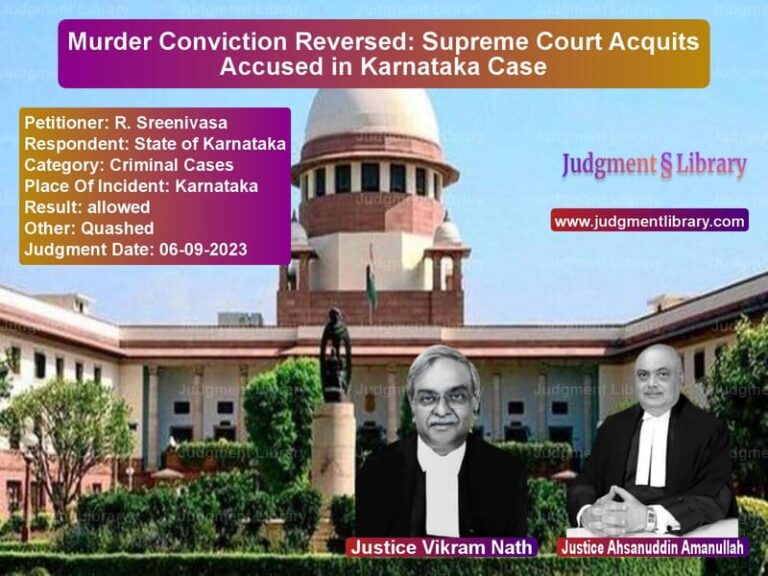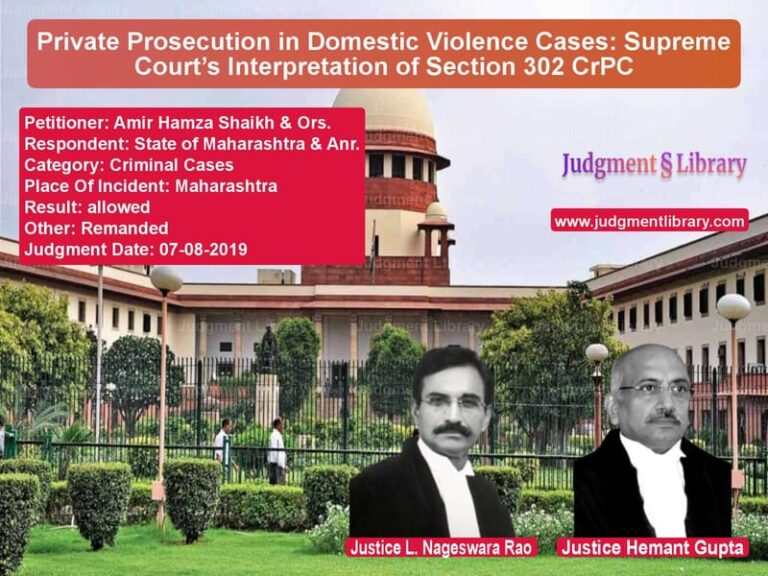Corporate Disputes and Oppression: Supreme Court Ruling on Shareholder Rights
The case of Ram Parshotam Mittal & Ors. vs. Hotel Queen Road Pvt. Ltd. & Ors. is a significant corporate dispute involving allegations of oppression and mismanagement under the Companies Act, 1956. The appeal arose out of a decision by the High Court of Delhi, which overturned the Company Law Board’s order regarding the ownership and management of Hotel Queen Road Pvt. Ltd. (HQRL). The Supreme Court was called upon to adjudicate the legality of share allotments, directorial appointments, and voting rights in the company.
The judgment focused on multiple legal questions, including the validity of company board resolutions, the rights of preference shareholders, and whether the actions of the majority shareholders were oppressive toward the minority stakeholders.
Background of the Case
The case originated from a corporate dispute concerning the control and management of HQRL, which owned the Indraprastha Hotel (formerly Hotel Ashok Yatri Niwas). The Government of India decided to disinvest its shares in HQRL as part of a broader privatization policy. The appellant group, led by Ram Parshotam Mittal, acquired the government’s shares, thereby gaining control of the company.
Subsequently, conflicts arose between the Mittal group and the respondent, Hillcrest Realty SDN BHD, a preference shareholder. Hillcrest alleged that the appellants had engaged in oppressive acts by issuing shares at an undervalued rate, thereby diluting their stake in the company. It also challenged the legality of various board resolutions and sought to exercise voting rights under Section 87(2)(b) of the Companies Act.
Petitioner’s (Ram Parshotam Mittal & Ors.) Arguments
- The issuance of shares was done legally and in compliance with the Articles of Association.
- The preference shareholder, Hillcrest, did not have the right to vote in board meetings under Section 87(2)(b) as there were no unpaid dividends.
- The financial investments by the Mittal group were substantial, and their management decisions were taken in the interest of the company.
- The High Court erred in interfering with the Company Law Board’s decision, which had found no oppression or mismanagement.
Respondent’s (Hotel Queen Road Pvt. Ltd. & Hillcrest Realty) Arguments
- The board resolutions passed on 27.7.2004, 7.1.2005, and 10.5.2005 were invalid as they were conducted without notice to all directors, violating Section 286 of the Companies Act.
- The share allotments were made at an undervalued price, benefiting the appellants while diluting Hillcrest’s stake.
- The Mittal group engaged in financial mismanagement, leading to the company’s financial distress.
- Hillcrest, as a preference shareholder, had acquired voting rights under Section 87(2)(b) due to unpaid dividends, making its exclusion from meetings illegal.
Supreme Court’s Observations
The Supreme Court examined whether the share allotments and resolutions were legal and whether the actions of the Mittal group constituted oppression under Section 397 of the Companies Act. The Court emphasized:
“The power of directors must be exercised in good faith and for the benefit of the company. Any act that is against probity, good conduct, or is burdensome, harsh, and wrongful, can be considered oppressive.”
The Court referred to its decision in Needle Industries (India) Ltd. v. Needle Industries Newey (India) Holding Ltd., where it was held that even legally permissible acts could be deemed oppressive if they were undertaken to disadvantage minority shareholders.
Key Findings of the Supreme Court
- The resolutions passed without due notice to all directors, including Ashok Mittal, were void as they violated Section 286.
- The share allotments were conducted without proper valuation and were aimed at strengthening the control of the Mittal group, making them oppressive.
- Hillcrest had acquired voting rights due to non-payment of dividends, and its exclusion from decision-making was unjustified.
- The financial mismanagement allegations required further scrutiny.
Final Verdict
The Supreme Court upheld the High Court’s decision to invalidate the disputed share allotments and directed the reinstatement of Hillcrest’s voting rights. The matter was remanded for further proceedings to determine the full extent of financial mismanagement.
Implications of the Judgment
This ruling reinforces the principle that corporate governance must adhere to transparency, fairness, and compliance with statutory requirements. It clarifies that majority shareholders cannot use their control to unfairly prejudice minority stakeholders, and that preference shareholders’ rights must be upheld in accordance with the law.
Petitioner Name: Ram Parshotam Mittal & Ors..Respondent Name: Hotel Queen Road Pvt. Ltd. & Ors..Judgment By: Justice Arun Mishra.Place Of Incident: Delhi.Judgment Date: 10-05-2019.
Don’t miss out on the full details! Download the complete judgment in PDF format below and gain valuable insights instantly!
Download Judgment: Ram Parshotam Mittal vs Hotel Queen Road Pvt Supreme Court of India Judgment Dated 10-05-2019.pdf
Direct Downlaod Judgment: Direct downlaod this Judgment
See all petitions in Company Law
See all petitions in Shareholder Disputes
See all petitions in Corporate Governance
See all petitions in Judgment by Arun Mishra
See all petitions in partially allowed
See all petitions in Remanded
See all petitions in supreme court of India judgments May 2019
See all petitions in 2019 judgments
See all posts in Corporate and Commercial Cases Category
See all allowed petitions in Corporate and Commercial Cases Category
See all Dismissed petitions in Corporate and Commercial Cases Category
See all partially allowed petitions in Corporate and Commercial Cases Category







